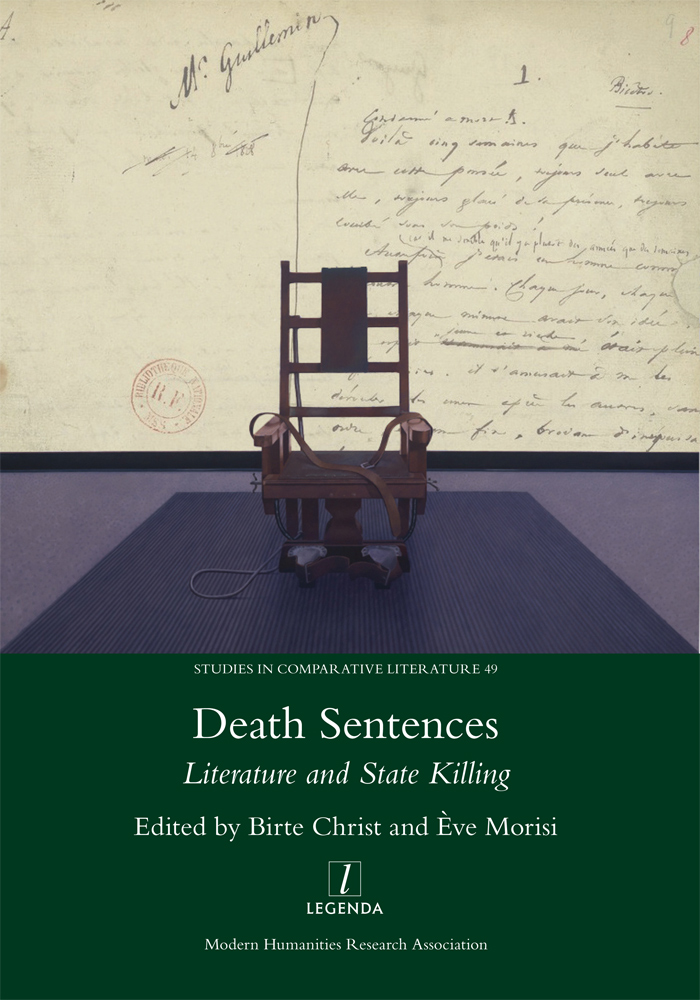
Death Sentences: Literature and State Killing
Studies in Comparative Literature 49
Oxford: Legenda, 2019
258 pages
ISBN: 978-1-781885-57-4 (hardback) • RRP £75, $99, €85
ISBN: 978-1-781885-58-1 (paperback, 2020)
ISBN: 978-1-781885-59-8 (JSTOR ebook)
Présentation:
"De la peine capitale, on n'écrit, si j'ose dire, qu'à voix basse", remarquait Albert Camus en 1957. Représentants de l'État et journalistes tendent à user d'un même langage policé lorsqu'il est question de la peine de mort: quand l'État exécute des individus, des acteurs-clés évoquent l'acte en termes de procédures et de règlements où domine l'euphémisme. Les oeuvres de fiction et de poésie font-elles contrepoids à ces codes langagiers ou se bornent-elles à les reproduire? Quelles autres perspectives peuvent-elles donner à voir? La littérature répond-elle à la justice de mort -- perçue soit comme une horreur nécessaire, soit comme une terrible injustice -- autrement que ne le font d'autres voix et médias?
À travers l'examen d'oeuvres majeures variées parues en Europe occidentale et aux États-Unis du XVIIIe siècle à nos jours, Death Sentences: Literature and State Killing explore la manière dont le travail poétique a contribué à notre compréhension, passée et présente, de la peine de mort. Les représentations littéraires complexes que forgent Hugo, Dostoïevski, Wilde, Kafka, Mailer, King et d'autres sont autant de points de vue privilégiés à partir desquels une institution unique, meurtrière, se voit éclairée et critiquée; ceci d'autant plus que son fonctionnement et sa légitimité dépendent eux-mêmes des mécanismes du spectacle et de la figuration.
[As Albert Camus once remarked: 'Of capital punishment, people write only [...] in a low voice.’ Journalists and state officials alike use a carefully policed language when making any reference to the death penalty: when human beings are to be executed by the state, some key actors talk about what will be done in terms of legalities and procedures. Does fiction provide a counterbalance for that discretion, or simply echo it? What other perspectives can it bring into the foreground, and can literary language express a response to a supposedly necessary horror, or a terrible injustice, which other voices or media cannot?
Considering a range of major works from across Western Europe and the United States, from the 18th century until the present day, Death Sentences investigates the contribution of poetics to our understanding, past and present, of capital punishment. The sophisticated literary representations found in Hugo, Dostoevsky, Wilde, Kafka, Mailer, King and others offer a privileged vantage point from which to illuminate and critique a unique institution which itself relies heavily on spectacle and representation to be operative and legitimized.]
Table des matières:
Introduction: Capital Literature
ÈVE MORISI
Part I: Fact and Fiction
Fedor Dostoevsky’s Death Sentences: Strategies of Indirection
WILLIAM MILLS TODD III
Matters of Grave Importance: Style in Norman Mailer’s The Executioner’s Song
BRIAN JARVIS
Part II: Punishment and Performance
‘Le peuple veut du sang’: The Guillotine and the General Will in Revolutionary Pamphlet Theatre
JESSICA GOODMAN
Listening for a Man Swinging: A Prisoner Witnesses in Oscar Wilde’s ‘The Ballad of Reading Gaol’
E. S. BURT
Merging Sovereignty and Meaning in Capital Punishment: Franz Kafka’s Der Proceß and Bertolt Brecht’s Die Maßnahme
DAVID PAN
Part III: Lyric and Law
Dreadful Forms: The Romantic Ballad and the Death Penalty
MARK CANUEL
A Song Before Execution: José de Espronceda’s ‘El reo de muerte’
MICHAEL IAROCCI
Part IV: Poetics and Politics
Putting Pain to Paper: Victor Hugo’s New Abolitionist Poetics
ÈVE MORISI
Novel Arguments Against Capital Punishment: Plotting Death Sentences in E. D. E. N. Southworth’s The Gipsy’s Prophecy and The Lost Heiress
JOHN CYRIL BARTON
Stephen King’s Poetic Justice: Seriality, Narrative Framing, and Intertextuality in The Green Mile
BIRTE CHRIST